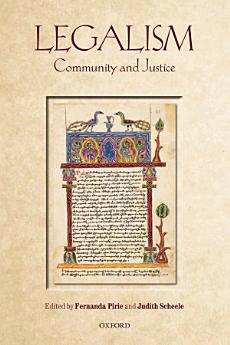Legalism: Community and Justice
Fernanda Pirie · Judith Scheele
ago. de 2014 · OUP Oxford
Libro electrónico
260
Páxinas
family_home
Apto
info
reportAs valoracións e as recensións non están verificadas Máis información
Acerca deste libro electrónico
'Community' and 'justice' recur in anthropological, historical, and legal scholarship, yet as concepts they are notoriously slippery. Historians and lawyers look to anthropologists as 'community specialists', but anthropologists often avoid the concept through circumlocution: although much used (and abused) by historians, legal thinkers, and political philosophers, the term remains strikingly indeterminate and often morally overdetermined. 'Justice', meanwhile, is elusive, alternately invoked as the goal of contemporary political theorizing, and wrapped in obscure philosophical controversy. A conceptual knot emerges in much legal and political thought between law, justice, and community, but theories abound, without any agreement over concepts. The contributors to this volume use empirical case studies to unpick threads of this knot. Local codes from Anglo-Saxon England, north Africa, and medieval Armenia indicate disjunctions between community boundaries and the subjects of local rules and categories; processes of justice from early modern Europe to eastern Tibet suggest new ways of conceptualizing the relationship between law and justice; and practices of exile that recur throughout the world illustrate contingent formulations of community. In the first book in the series, Legalism: Anthropology and History, law was addressed through a focus on local legal categories as conceptual tools. Here this approach is extended to the ideas and ideals of justice and community. Rigorous cross-cultural comparison allows the contributors to avoid normative assumptions, while opening new avenues of inquiry for lawyers, anthropologists, and historians alike.
Acerca do autor
Fernanda Pirie is University Lecturer in socio-legal studies at the University of Oxford, and Director of the University's Centre for Socio-Legal Studies. An anthropologist by training, following a career at the London Bar, she has carried out fieldwork for over a decade on the Tibetan plateau. Her studies have centred on conflict resolution, social order, and tribe-state relation. She is the author of The Anthropology of Law (2013). Judith Scheele is a social anthropologist and a post-doctoral research fellow at All Souls College, Oxford. Her research focuses on North Africa and the Sahara, in particular Algeria, Mali, and Chad. Her publications include Village Matters: Knowledge, Politics and Community in Kabylia (2009) and Smugglers and Saints of the Sahara: Regional Connectivity in the Twentieth Century (2012). The authors are among the coordinators of the Oxford Legalism project, which brings together scholars from law, history, anthropology, classics, and oriental studies in a series of seminars and workshops, to compare examples of legalistic thought, texts, and practices, from across the world.
Valora este libro electrónico
Dános a túa opinión.
Información de lectura
Smartphones e tabletas
Instala a aplicación Google Play Libros para Android e iPad/iPhone. Sincronízase automaticamente coa túa conta e permíteche ler contido en liña ou sen conexión desde calquera lugar.
Portátiles e ordenadores de escritorio
Podes escoitar os audiolibros comprados en Google Play a través do navegador web do ordenador.
Lectores de libros electrónicos e outros dispositivos
Para ler contido en dispositivos de tinta electrónica, como os lectores de libros electrónicos Kobo, é necesario descargar un ficheiro e transferilo ao dispositivo. Sigue as instrucións detalladas do Centro de axuda para transferir ficheiros a lectores electrónicos admitidos.





